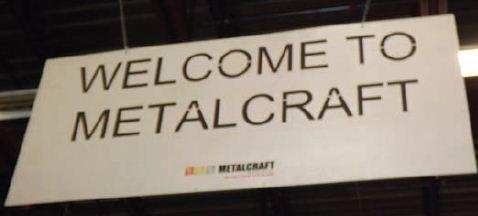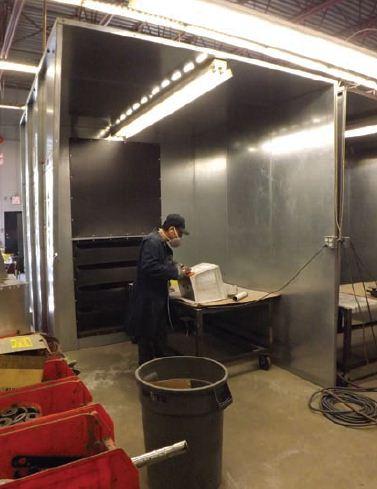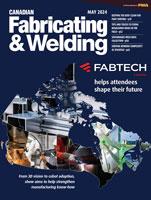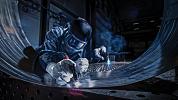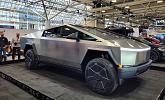- FMA
- The Fabricator
- FABTECH
- Canadian Metalworking
SME Success Stories: The West Coast Way
Metalcraft Technology forms sheet for the world from Coquitlam, B.C.
- By Jim Anderton
- August 12, 2014
- Article
- Fabricating
Coquitlam, like much of the lower mainland of Western British Columbia, welcomes spring with a verdant rush that makes it seem more green and lush than is possible to Canadians east of the Rockies. Across from a schoolyard ball field and backing onto a row of comfortable detached homes is a nondescript, straightforward 40,000 square foot building. This is the home of Metalcraft Technology, a second generation business that has called the city home since their founding in 1997.
“My father started Metalcraft Technology in 1997, working strictly with sheet metal.” says Production Manager Feroz Abdulla, adding “He started making mostly power supplies and enclosures.” While electronics still forms a major part of the business, Metalcraft Technology has grown into a firm capable of cutting, bending, welding and finishing a broad range of parts in many metals. The two shift operation is ISO 9001 registered, LEED and Controlled Goods certified and serves the electronics, oil and gas, industrial and many other industries. While many medium sized firms like Metalcraft Technology works a narrow range of part sizes, handling parts of all shapes and sizes can be seen in process. “The smallest is about the size of a fingernail and the largest is fourteen by five feet.” states Abdulla. Materials include cold rolled steels, stainless, aluminium and surprisingly for a shop handling large industrial parts, copper, a consequence of power supply work and suggests bus bars that carry serious current. While being ISO registered is common in advanced Canadian fab shops, the Controlled Goods certification allows Metalcraft Technology to bid on military work that the firm can only describe in general terms. “I can’t say specifically...we’ve done military shelters, kitchens; they need a certified supplier and we document the work fully.”
While government work operates on a schedule driven by that customer’s unique bureaucracy, the needs of business for fast turnaround parts frequently challenges the engineering and production team at Metalcraft. “They’ve asked for parts in one day.” laughs Abdulla.
“Send it to Germany please. Sometimes they’re in a panic and frequently we’ll pull some strings. Often we can give them a turnaround time of a few days. Normally, the first order is in two or three weeks. If they give us some lead time, our QC process can guarantee the parts.” Quality comes up often in the conversation and a tour of the facility shows Kanban and Lean systems everywhere, from individual workstations to the climate-controlled QC lab.
“First off’s are inspected.” states Abdulla, adding “We have a batch count driven system for small batches, we’ll inspect them all.” We can track tickets through the system by computer. There’s a Team Leader in every department. QC will do inspection reports as needed for the customer as well.”
While the design, production and quality processes are all computer aided, Metalcraft Technology makes extensive use of paper-based systems especially where team members can see process parameters at a glance using wall or workstation-mounted charts. Lean processes are not new at Metalcraft Technology, which began the process as early as 2002. “The results improved all areas of the operation.” according to Abdulla “Our inventory was too high. We controlled lead times first. We controlled by what we wanted, not by the amount we consumed in the year. It’s a just-in-time system and it reduced our inventory by 25 percent. Safety improved, also. It (Lean) went right down to how our employees stacked the parts. Our stock room is almost empty, just the minimum we need. We do a “5S” audit every month, it gives the teams the flexibility to be in control of their stations.”
Like the production systems used in large manufacturing plants, Metalcraft doesn’t operate in a vacuum. “Vendors have to be tied in with us as well. We audit the suppliers. We’re close to our suppliers, We’ve achieved numerous awards from them.”
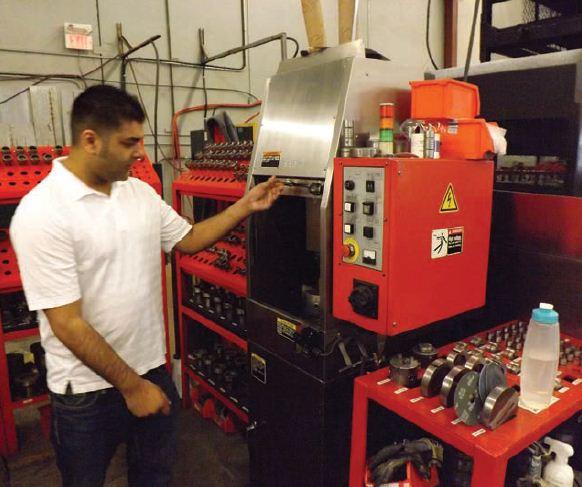
Feroz Abdulla beside the punch and die grinding station. The in-house capability keeps sharp tools at hand, minimizing burrs and rework.
On the equipment side, Metalcraft Technology is substantially different from most Canadian fab operations. All metal fabricating equipment is sourced from a single manufacturer, Amada. Literally everything that cuts, bends or punches metal. The decision to equip entirely with Amada machines was the result of a “clean sheet” redesign of the production floor two years ago with a layout designed by Amada Engineers. Units include a punch/laser combo and two new brakes. “The goal was to simultaneously add capability and efficiency.” says Abdulla “As technology grows we need to be in that scene as well. We need to be where the new markets are. If we get behind, we can’t make elaborate shapes. We need to harvest that advantage, plus the shorter learning curve, reducing setup time. The all-Amada setup also allows commonality of machine control architecture throughout the shop, with obvious advantages. It’s all common, one universal control. It’s easy to train operators and they’re networked by hard lines and wireless.”
Welding at Metalcraft Technology is by MIG and TIG processes, as well as spot welding. Future plans include a new robotic laser welding system from Amada America that the firm recently exhibited at their Digital Innovation Expo in Illinois. The system is scheduled for North American release early this summer. The new system is part of a highly robotic future for Metalcraft Technology. “It’s a big factor for us.” declares Abdulla. “We can build things on the fly that we never could before. We don’t need three shifts. On the weekends we can preload it and let it run; there are lots of ways to take advantage of it. In a couple of years we want to be lights out, fully automated.”
Metalcraft is all process control, both in the quality sense and in the firm’s willingness to take on functions not often seen in similarly sized Canadian shops. An example is an in-house powder coating line, part of a three million dollar plant upgrade. It uses a water-based process to eliminate the environmental and safety risks, as well as the regulatory issues that are tightening yearly due to new rules on volatile organic compounds. The only waste product requiring specialty disposal is relatively benign iron phosphate. With VOC regulations chasing finishing operations out of many Canadian fab shops, why take on in-house powder coating? “Again, it’s about control. Fuel prices and shipping got too high.” says Abdulla adding, “With our Kanban system we wanted total control over the process. We can change colours on the fly and we control packaging. We can package and ship directly to customers, rather than receiving the products packaged then checking them again for damage. It runs about 10 hours a day.” The result of this attention to process detail is a 30 percent jump in sales this year, the best ever for the company. While Eastern Canadians might assume that an operation located west of the Rockies would be restricted to local markets only, Metalcraft has a healthy sales mix of 20 percent US-based customers, 20 percent to the rest of Canada and the balance locally-based, with some exports as far as Taiwan. While many manufacturers struggle with the dollar exchange when shipping south of the border, Metalcraft Technology uses fast turnaround times to win customers who need their parts on time. “Our customers are okay with shipping costs, they just want their parts on time.” relates Abdulla “Some of our US suppliers have had to wait six weeks or more. Our customers are willing to pay the shipping.”
[gallery type="slideshow" link="none" ids="104890,104891,104892,104893,104894,104895"]
Metalcraft Technology’s enviable success is ultimately a combination of modern manufacturing technique, the right equipment and a cooperative collaborative approach toward customers and vendors. “Everything is referrals.” states Abdulla “It might be about engineering, or just looking at their parts and seeing how they could be changed to make them better. It’s about being aware of what customers want, how to talk to them and how to solve their problems. It’s not about selling them anything, it’s about how we can help.”
About the Author
subscribe now


Keep up to date with the latest news, events, and technology for all things metal from our pair of monthly magazines written specifically for Canadian manufacturers!
Start Your Free Subscription- Industry Events
Automate 2024
- May 6 - 9, 2024
- Chicago, IL
ANCA Open House
- May 7 - 8, 2024
- Wixom, MI
17th annual Joint Open House
- May 8 - 9, 2024
- Oakville and Mississauga, ON Canada
MME Saskatoon
- May 28, 2024
- Saskatoon, SK Canada
CME's Health & Safety Symposium for Manufacturers
- May 29, 2024
- Mississauga, ON Canada













